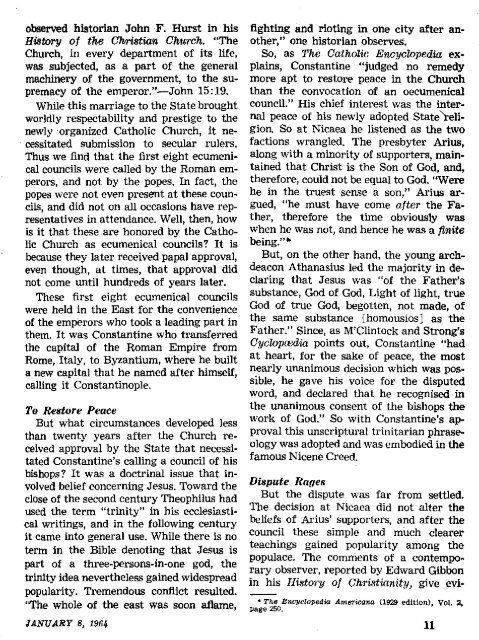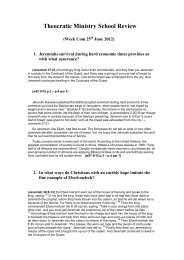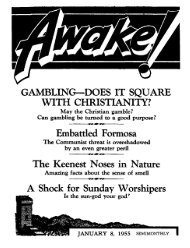1964 Awake! - Theocratic Collector.com
1964 Awake! - Theocratic Collector.com
1964 Awake! - Theocratic Collector.com
You also want an ePaper? Increase the reach of your titles
YUMPU automatically turns print PDFs into web optimized ePapers that Google loves.
observed historian John F. Hurst in his<br />
HiBtary of the Christian Church. "The<br />
Church, in every department of its life,<br />
was subjected, as a part of the general<br />
machinery of the government, to the supremacy<br />
of the emperor."-John 15:19.<br />
While this marriage to the State brought<br />
worldly respectability and prestige to the<br />
newly ·organized Catholic Church, it necessitated<br />
submission to secular rulers.<br />
Thus we find that the first eight ecumenical<br />
councils were called by the Roman emperQl'S,<br />
and not by the popes. In fact, the<br />
popes were not even present at these councils,<br />
and did not on all occasions have representatives<br />
in attendance. Well, then, how<br />
is it that these are honored by the Catholic<br />
Church as ecumenical cOW1cils? It is<br />
because they later received papal approval,<br />
even though, at times, that approval did<br />
not <strong>com</strong>e until hundreds of years later.<br />
These first eight ecwnenical councils<br />
were held in the East for the convenience<br />
of the emperors who took a leading part in<br />
them. It was Constantine who transferred<br />
the capital of the Roman Empire from<br />
Rome, Italy, to Byzantium, where he built<br />
a new capital that he named after himseU,<br />
calling it Constantinople.<br />
To Restore Peace<br />
But what circumstances developed less<br />
than twenty years after the Church received<br />
approval by the State that necessitated<br />
Constantine's calling a council of his<br />
bishops? It was a doctrinal issue that involved<br />
belief concerning Jesus. Toward the<br />
close of the second century Theophilus had<br />
used the term "trinity" in his ecclesiastical<br />
writings, and in the following century<br />
it came into general use. While there is no<br />
term in the Bible denoting that Jesus is<br />
part of a three-persons-in-one god, the<br />
trinity idea nevertheless gained widespread<br />
popularity. Tremendous conflict resulted.<br />
''The whole of the east was soon aftame,<br />
JANUARY 8, <strong>1964</strong><br />
fighting and rioting in one city after another,"<br />
one historian observes.<br />
So, as The Catholic Encyclopedia explains,<br />
Constantine "judged no remedy<br />
more apt to restore peace in the Church<br />
than the convocation of an oecumenical<br />
council." His chief interest was the internal<br />
peace of his newly adopted State religion.<br />
So at Nicaea he listened as the two<br />
factions wrangled. The presbyter Arius,<br />
along with a minority of supporters, maintained<br />
that Christ is the Son of God, and,<br />
therefore, could not be equal to God. "Were<br />
he in the truest sense a son," Arius argued,<br />
"he must have <strong>com</strong>e after the Father,<br />
therefore the time obviously was<br />
when he was not, and hence he was a finite<br />
being."·<br />
.But, on the other hand, the young archdeacon<br />
Athanasius led the majority in declaring<br />
that Jesus was "of the Father's<br />
substance, God of God, Light of light, true<br />
God of true God, begotten, not made, of<br />
the same substance [homousios] as the<br />
Father." Since, as M'Clintock and Strong's<br />
Cyclopcedia points out, Constantine "had<br />
at heart, for the sake of peace, the most<br />
nearly unanimous decision which was possible,<br />
he gave his voice for the disputed<br />
word, and declared that he recognised in<br />
the unanimous consent of the bishops the<br />
work of God." So with Constantine's approval<br />
this unscriptural trinitarian phraseology<br />
was adopted and was embodied in the<br />
famous Nicene Creed.<br />
Dispute Rages<br />
But the dispute was far from seWed.<br />
The decision at Nicaea did not alter the<br />
beliefs of Arius' supporters, and after the<br />
council these simple and much clearer<br />
teachings gained popularity among the<br />
populace. The <strong>com</strong>ments of a contemporary<br />
observer, reported by Edward Gibbon<br />
in his History of Christianity, give evi-<br />
• The Encydopedkl Americana (1929 edition), Vol. :.I<br />
page 250. •<br />
11




